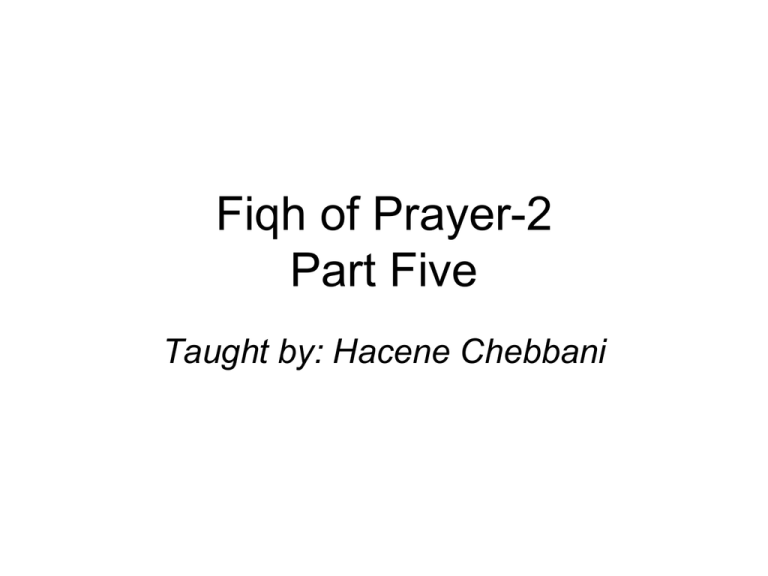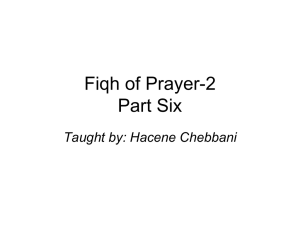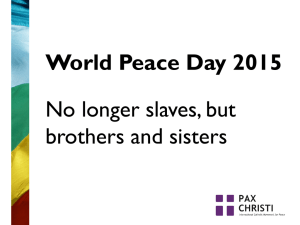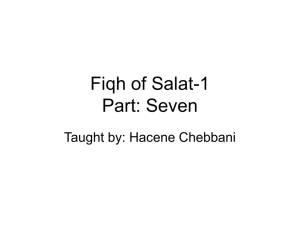Fiqh of Prayer-2 Part Five
advertisement

Fiqh of Prayer-2 Part Five Taught by: Hacene Chebbani The Non-Obligatory Prayers. An-Nawaafil Their Virtues • They make up for any lack or deficiency in the obligatory prayers on the Day of Judgment. • Allah loves those who perform voluntary deeds. • They serve as a protection and spiritual fence to the obligatory prayers. • They make your scale heavy and they will be a source of elevation on the Day of Judgment. Types of Voluntary Prayers. • There are two types of voluntary prayers: • Specific voluntary prayers. (they are divided into stressed and non-stressed sunah prayers) – As-Sunan Ar-raatibah – Witr Prayer – Aduha Prayer – Two raka’hs between athaan and Iqamah. • Non-specific voluntary prayers. – General nawaafil As-Sunan Ar-Raatibah • They are: – Two raka’hs before Fajr Prayer – Two or Four raka’hs before Dhuhr Prayer. – Two raka’hs after Dhuhr Prayer. – Two raka’hs after Maghrib Prayer. – Two raka’hs after Isha’ Prayer. – So they are either 10 or 12 raka’hs. Their Virtues. • The virtues of the two raka’hs before Fajr: • Hadith “They are dearer to me than the whole world.” (M/others) • Aishah said: “I have never seen him [the Prophet] more in haste to do a good deed than he was to perform the two rak’ahs before Fajr Prayer.” (Saheeh at-Targheeb) Continued • The virtues of Ar-Rawatib: • Ibn Umar ® said: “I have memorized from the Prophet (pbuh) 10 raka’hs: two before Dhuhr and two after it, two after Maghrib and two after I’sha’; two before Fajr Prayer.” (B) • Umm Habibah bint Abu Sufyan ® reports that the Prophet (pbuh) said: “Whoever prays 12 raka’hs during the day and night will have a house built for him in paradise: 4 before Dhuhr and 2 after it, 2 after Maghrib, 2 after Isha’, and 2 raka’hs before Fajr.” (Saheeh al-jami’/Muslim in brief report.) Continued • Aishah said about the prayer of Allah’s Messenger (pbuh): “He would never leave four raka’hs before Dhuhr and two before Fajr.” (B) • 2 or 4 before Dhuhr? • Both options are fine, but whoever wants the special reward of a house in Jannah, he/she should keep on praying 12 raka’hs every day. (which means he/she should pray 4 before Dhuhr.) Allah knows best. Notes 1. The two raka’hs before Fajr should be made very quickly. Hadith of Hafsa (B/M) 2. Allah’s Messenger (pbuh) used to recite in them, either Al-kafiroon and al-Ikhlaas, or verse:136 from al-Baqara in the first raka’h and verse: 64 from Al-Imran in the second raka’h. (M) 3. After the Prophet (pbuh) had prayed the two sunnah raka’hs of the Fajr, he would lie down on his right side. He used to do it at home. Offering Voluntary Prayers at Home. • Jabir ® reported that Allah’s Messenger (pbuh) said: “When any of you performs his prayers in the Masjid, he should allocate a portion of his prayers to his house, for verily Allah enlightens his house through his prayers.” (M) • Zayd bin Thaabit ® reported that the Prophet (pbuh) said: “You should pray in your houses, for the best prayer of a man is that which he prays in his house, except the obligatory prayers.” (B/M) The Witr Prayer • Its Excellence and Virtues: • Ali ® said: “The witr prayer is not required like your obligatory prayers, but the Prophet performed witr prayer and said: ‘O you people of the Quran, perform the witr prayer, for Allah is one and He loves the witr.” (4 Sunan/Ahmed) • The witr prayer is a highly recommended prayer ( A stressed sunnah prayer) (This is the opinion of al-Jumhoor). • Abu Hanifa (May Allah have mercy on him) is the only one who said that witr prayer is wajib. Its Time. • All the scholars agreed that the time for witr prayer does not begin until after Isha’ Prayer and it continues until the time of Fajr Prayer. • Sometimes, Allah’s Messenger (pbuh) would make the witr prayer in the first part of the night and sometimes he would make it in the latter portion of the night. • It is preferred to pray it early if he suspects that he will not wake up during the latter portion of the night. It is, on the other hand, preferable to delay it if one believes that he will be able to wake up before Fajr time. How Many Raka’hs in Witr Prayer? 1. The minimum number of rak’ahs for witr prayer is one rak’ah. “The witr prayer is one rak’ah at the end of the night.” (M) “The night prayers are two raka’hs by two, but if one of you fears that dawn is about to break, let him pray one raka’h to make what he has prayed oddnumbered.” (B/M) Continued 2. Second Option: Three Raka’hs. This can be done in two ways: 1. To pray them one after another with one tashahud “He used to pray witr with three raka’hs and he did not sit except in the last one.” (Nasai’/Bayhaqi) 2. Saying the tasleem after two raka’hs, then praying one raka’h by its own. Abdullah bin Umar used to do it and said that Allah’s Messenger (pbuh) used to do that. (Ibn Hibaan) Continued 3. Third/ Fourth Options: Five raka’hs or Seven raka’hs with one Tashahud. Aisha ® said: “The Messenger of Allah (pbuh) used to pray 13 raka’hs at night, praying five raka’hs of witr, in which he would not sit except in the last rak’ah.” (M) Umm Salamah ® said: “The Prophet (pbuh) used to pray witr with five or seven raka’hs and he did not separate between them with any salaam or words.” (Ahmad/Nasai’/others) Note: It is ok if we recite a tashahud after the sixth raka’h without salaam and then we finish it with the seventh raka’h based on an authentic hadith of Aisha ® Continued 4. Fifth Option: Nine raka’hs. Aisha ® said that the Prophet (pbuh) used to pray nine raka’hs in which he did not sit except in the eighth, when he would remember Allah, praise Him and call upon Him. Then he would get up and not say the tasleem, and he would stand up and pray the ninth raka’h, then he would make tashahud, and say a tasleem that we could hear.” (M) Recitation in Witr Prayer • Ali ® said: “There is no part from the Quran that is deserted, so make the witr prayer of whatever you wish from it.” • If we pray witr with three raka’hs, then we should recite in the first raka’h surah AlAa’lah. In the second raka’h, it is preferred to recite surah al-Kafiroon, and surah alIkhlaas (Nasai’) or the last three surahs in the last raka’h. (Tirmithi) Dua’ of Qunoot in Witr • Al-Hassan bin Ali ® said: “Allah’s Messenger (pbuh) taught me some words to say in witr: ”اللهم اهدني فيمن هديت و عافني فيمن عافيت و تولني فيمن توليت و بارك لي فيما أعطيت و قني شرّ ما قضيت فإ ّنك تقضي و ال يقضى عليك و إ ّنه ال يذل من واليت و ال يعز من عاديت ،تباركت ربنا و تعاليت “.النسائي و الترمذي و غيرهما. >> • Which means: Continued • O Allah! Guide me among those You have guided. Grant me safety among those whom You have granted safety. Take me into Your charge among those whom You have taken into Your charge. Bless what You have given to me. Protect me from the evil which You have decreed, for You decree and nothing is decreed against You. There is no humiliation for him whom You take as a ward and there is no dignity for him whom You take as an enemy. Blessed and exalted are You, O our Lord!” (Nasai’/Tirmithi/Others) Notes • It is permissible to make the Qunoot before ruku’ or after ruku’. Both options are fine. • Making the dua’ of Qunoot is not a sunnah that should be done every night. It should be recited on and off. And Allah knows best.











